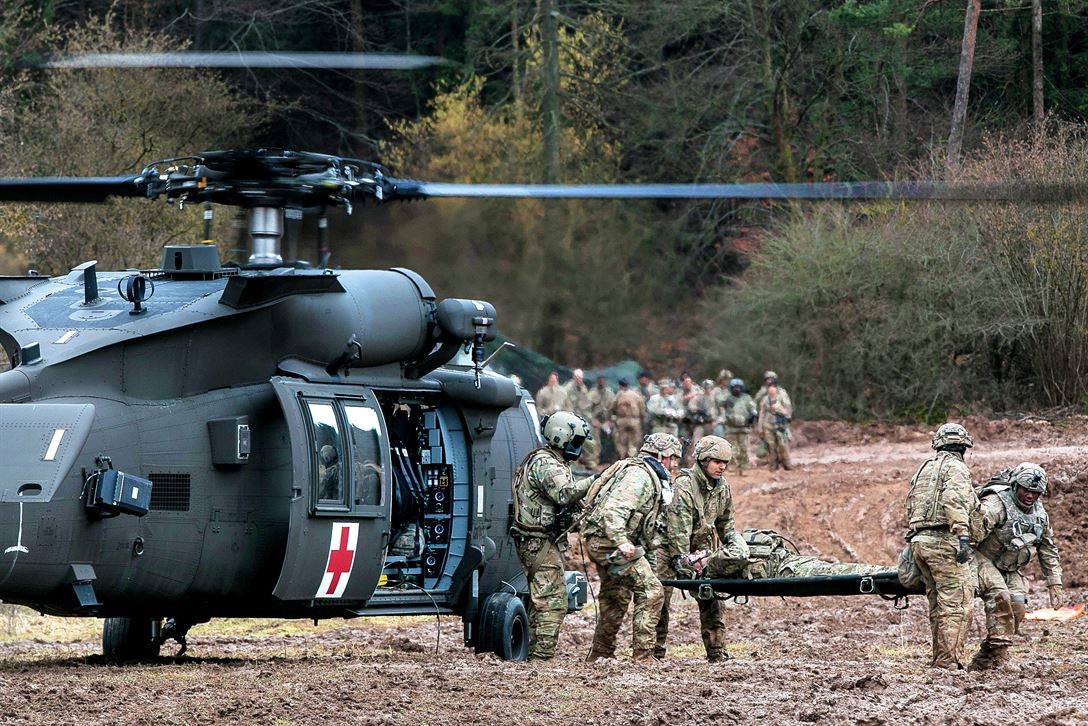Charles River Analytics Inc., developer of intelligent systems solutions, is building a medical simulation and tutoring system for the US Army, designed to improve medical training and patient care. As part of a two-year contract valued near $1.5 million, Charles River is partnering with Professors Frank Ritter and Chris Garrison of the Pennsylvania State University (PSU), to build a Virtual Intelligent Tutor for the Andragogy of Military Medicine Integrated Skills (VITAMMINS).
“Military medical care providers are under constant strain to learn new medical devices, procedures, and skills to ensure the best possible patient care,” said Dr. James Niehaus, Senior Scientist at Charles River. “Adaptive training systems that tailor themselves to individual provider needs can reduce training time while maximizing learning. We’re developing a system to address key questions in building the next generation of training for military medicine.”
Soldiers conduct rapid medical evacuation training during Allied Spirit VIII at Hohenfels Training Area, Germany (Image source: Defense.gov)
US military medicine sets a standard of care across the world, bringing techniques to austere environments under challenging conditions. Medical personnel must be trained in the continuously evolving medical practices and the development of new devices, techniques, and procedures.
Charles River and PSU are building on their years of partnership in the design and development of intelligent tutoring systems (ITSs), simulation-based training systems, and skill modeling methods and technologies under the VITAMMINS effort. VITAMMINS is an adaptive tutor for the military medical domain that aims to improve the quality and efficiency of medical skill training and sustainment, as well as reducing the costs and time necessary for training. VITAMMINS accurately classifies an individual’s skill and continuously adapts training content to meet individual learning needs to maximize both skill improvement and sustainment. Patients benefit directly from this training; they will receive a higher quality of care from medical professionals who are better trained to meet the needs of tomorrow’s medicine.
To develop skill models in VITAMMINS, Charles River will use its Methodology for Annotating Skill Trees (MAST) set of tools. MAST rapidly captures, represents, assesses, and trains deep knowledge about complex procedural skills, including decision making and situational awareness. We developed MAST to develop laparoscopic surgical skills under our LASTS laparoscopic training system.
VITAMMINS is one of our Healthcare Support and Training efforts, which addresses medical skills training, therapy and decision support tools, as well as sensor and sensing technologies. We also developed the TMT tourniquet training system and the STAT tablet-based training system, which presents a virtual patient in multiple trauma scenarios for efficient and effective learning, rehearsal, and assessment.
This material is based upon work supported by the Congressionally Directed Medical Research Program (CDMRP) and the U.S. Army Medical Research Acquisition Activity (USAMRAA) under Contract No. W81XWH-17-C-0002. Any opinions, findings and conclusions or recommendations expressed in this material are those of the author(s) and do not necessarily reflect the views of the Congressionally Directed Medical Research Program (CDMRP) or the U.S. Army Medical Research Acquisition Activity (USAMRAA). The appearance of U.S. Department of Defense (DoD) visual information does not imply or constitute DoD endorsement.
In the conduct of research where humans are the subjects, the investigator(s) adhered to the policies regarding the protection of human subjects as prescribed by Code of Federal Regulations (CFR) Title 45, Volume 1, Part 46; Title 32, Chapter 1, Part 219; and Title 21, Chapter 1, Part 50 (Protection of Human Subjects).

